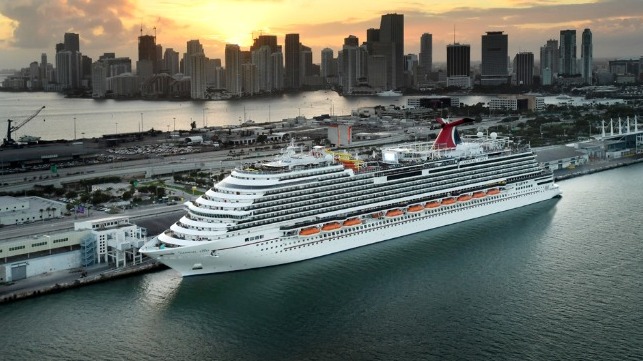
The mediator in the lawsuit brought by the state of Florida seeking to force the immediate restart of cruises informed the US District Court judge that Florida and the US Centers for Disease Control are deadlocked. By declaring an impasse in the mediation, the case has been sent back to the court to decide the issue.
Both sides in the case made new filings with the court renewing the argument over the CDC’s jurisdiction and actions under its current Conditional Sail Order and the framework by which cruise lines are permitted to apply for a return to service. Filing the case in April, Florida, which was later joined by Alaska and Texas in the suit, contended that the CDC had overstepped its authority and was unfairly singling out the cruise industry causing significant harm to the state.
Since the filing of the case, the CDC has proceeded with its framework and granted approvals for the first cruises and simulated test cruises on the path to the restoration of cruises from US ports. In addition, President Joe Biden signed into law the Alaska Tourism Restoration Act, which exempted large ships from US sabotage regulations to permit 2021 summer cruises to Alaska while Canadian ports remain closed.
In addition to telling the court that the CDC is following protocols designed to ensure the health and safety of Americans, the CDC is asking the court to permit the filing of a supplemental briefing on the Alaska act and the potential impact a decision in the Florida case might have on the resumption of cruising in Alaska. The Congressional act says that foreign flag cruise ships can resume sailing to Alaska abiding by the rules and restrictions of the CDC. Lawyers for the CDC contend that if the court voids the Conditional Sail Order it would put this summer’s Alaska cruises in jeopardy.
“Florida is, however, concerned that further briefing will only serve to delay a ruling on Florida’s motion for a preliminary injunction. With each passing day that cruises – a singled-out industry – cannot operate, Florida suffers irreparable harm,” they write in their response to the court. Florida’s lawyers contended that the act confirms Florida’s case in that the CDC required Congress’s authorization and that by not mentioning Florida in the act, “that Congress decided not to ratify the CDC’s conduct as to Florida.”
Florida Governor Ron DeSantis speaking after the impact was declared said, “Unfortunately, the CDC has opted to continue its ridiculous and unlawful regulations that target a single industry by imposing vaccine requirements — something no other business or industry must do.” DeSantis in his attacks on the CDC said that it is discriminating against families and children with its masking and vaccine mandates for cruises and imposing burdensome requirements that are continuing to change and that are delaying the resumption of cruising.
“The CDC did almost nothing to re-open sailing until Florida filed suit,” said DeSantis. “While it is a positive sign to see the CDC begin to green light ‘conditional cruises’ following Florida’s lawsuit, there is still no set date upon which cruises can resume business operations. The CDC has no excuse for ruining two summers of sailing, and it is well past time to end the CDC’s desperate attempt to prolong its power trip over America. Floridians are ready for a real trip on our waters.”
While the court continues to hear the arguments in the case, the CDC is, however, also moving forward with its framework for the resumption of cruising. After giving Royal Caribbean International approval for the first simulated cruise and Celebrity Cruises permission to resume restricted revenue service, the CDC has now approved 10 cruise ship applications with one additional pending approval. Celebrity Cruises received approval for a second ship to resume service operating with fully vaccinated passengers and crew, while Disney Cruise Line gained approval for a test cruise and was the first approved for Port Canaveral, Florida. Carnival Cruise Line has also received approval for two of its cruise ships to operate simulated a cruise from Miami and Galveston, while Royal Caribbean received approval for four additional cruise ships to operate simulated voyages. Bahamas Paradise Cruise Line currently has provisional approval for a test cruise. Once the cruise lines have demonstrated to the CDC the effectiveness of their health and safety protocols those ships should receive conditional sail orders.
The major challenge for the cruise lines is the CDC’s requirement for face coverings for non-vaccinated passengers and in large gatherings, and the cruise lines’ requirement to certify that passengers are vaccinated. Florida outlawed the use of vaccine passports and has threatened to fine the cruise lines if they proceed to ask for proof of vaccination status. Florida’s governor declined a suggestion that cruise lines be exempted from the ordinance permitting them to follow CDC restrictions once passengers boarded their ships.
Florida in its legal case is continuing to press the court to issue an immediate injunction against the CDC. They argue the injunction is necessary so that the cruise lines could resume sailing this summer, while the cruise lines have cautioned that it will require time to restaff and restart the broader fleet of cruise ships that have been idled and in many cases destaffed for nearly a year.
SOURCE READ THE FULL ARTICLE
https://www.maritime-executive.com/article/mediation-impasse-in-florida-s-suit-over-cdc-cruise-restrictions